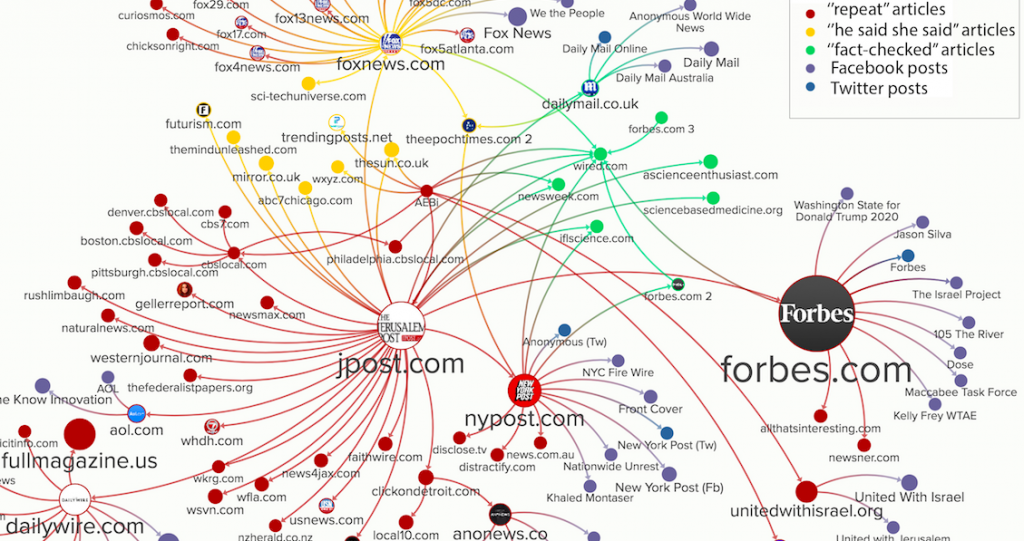Stay up to date by subscribing to our Newsletter or by following our Telegram channel, and join the conversation on Facebook and Twitter.
Edited by Marco Nurra
Presenting #ijf19. The 2019 festival will be the best yet. More than 650 speakers – of whom 49% are women – will take part in about 280 sessions. This is a condensed version (about one third) of the festival programme, divided category by category.
Here is who repeated an unsupported claim about “a complete cure for cancer in a year”, misleading millions on social media. “This claim of a groundbreaking discovery spread quite widely, mostly driven by the initial coverage from the Jerusalem Post. We identified 709 articles from the past month linking back to the Jerusalem Post article and a few hundreds more covering the claim by conducting a search on Buzzsumo. […] We found that 59 of these articles took the claim reported by the Jerusalem Post at face value. These articles failed to perform significant fact-checking or scientific verification of these claims (some included only a very minimal check with independent experts) – a basic practice in responsible journalism. These articles also failed to signal to readers that the report was unsubstantiated.”
The old and new public health risks of networked health misinformation. Without historical context, health misinformation risks being mistaken for a phenomenon of the internet’s unique participatory nature.
🔔 We’ll tackle the topic of public health misinformation at #ijf19: “Vaccinating against misinfodemics: journalists and public health misinformation“
Is expert crowdsourcing the solution to health misinformation? “That process, in which verified scientists review scientific claims online, is essentially elevated crowdsourcing.”
🔔 Emmanuel Vincent, cofounder of Climate Feedback and Health Feedback, will be a #ijf19 speaker
New Zealand massacre: Journalists divided on how to cover hate. “Almost everyone agreed that posting the actual video of the killings was beyond the pale (The Mirror in Britain included edited footage from the video and later apologized, but the Daily Mail had a video clip that auto-played on its site). Whether to report on the killer’s writing about his deed was another matter. Sociologists who study the way information spreads online—including Joan Donovan of Harvard’s Shorenstein Center and Whitney Phillips, who wrote a report for Data & Society last year titled “The Oxygen of Amplification”—advised journalists not to quote from the killer’s writing.”
🔔 Joan Donovan, director of the Technology and Social Change Research Project at Harvard Kennedy’s Shorenstein Center, will be a #ijf19 speaker
BBC News shows that hard-hitting solutions journalism stories can thrive on social media. “How do we respond to a tragic situation in a world of the like button, where audiences shy away from negative stories?”
🔔 We’ll tackle the topic of solution journalism at #ijf19: “Solutions journalism in Europe“
How to build a newsroom culture that cares about metrics beyond pageviews. “The most powerful predictor for how metrics adoption will go in a newsroom is whether reporters are interested in how their communities experience and respond to journalism.”
🔔 We’ll tackle the topic of metrics at #ijf19 on these panels: “Impact measurement: tools, frameworks and case studies“, “Measuring what matters: new ways of quantifying the impact of great journalism“
The New York Times is planning to experiment with blockchain publishing. According to a job posting that appeared on the Times’ website Wednesday, the media organization is looking for someone to help “design a blockchain-based proof of concept for news publishers.” The new hire “will codify the vision for the research project and share that vision with potential stakeholders at other media organizations” and “help brand and create a public identity and assets for the project.”
🔔 We’ll tackle the topic of blockchain at #ijf19: “What can blockchain do for news?“
Can our corrections catch up to our mistakes as they spread across social media? “Even the best reporters eventually get something wrong. This experiment tried to use the tools we use to spread our stories to spread our mea culpas.”
🔔 Dan Gillmor will be a #ijf19 speaker


